The Toshiba/Kioxia BG4 1TB SSD Review: A Look At Your Next Laptop's SSD
by Billy Tallis on October 18, 2019 11:30 AM ESTAnandTech Storage Bench - Light
Our Light storage test has relatively more sequential accesses and lower queue depths than The Destroyer or the Heavy test, and it's by far the shortest test overall. It's based largely on applications that aren't highly dependent on storage performance, so this is a test more of application launch times and file load times. This test can be seen as the sum of all the little delays in daily usage, but with the idle times trimmed to 25ms it takes less than half an hour to run. Details of the Light test can be found here. As with the ATSB Heavy test, this test is run with the drive both freshly erased and empty, and after filling the drive with sequential writes.
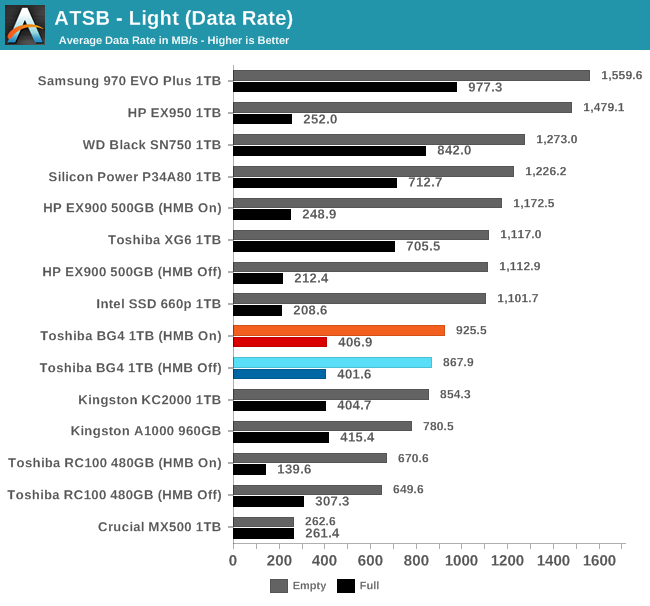
With the Light test, the Toshiba/Kioxia BG4 is back to outperforming its predecessors, but it isn't providing a challenge to most of the high-end drives. The full-drive performance of the BG4 is better than most entry-level drives and beats some high-end drives.
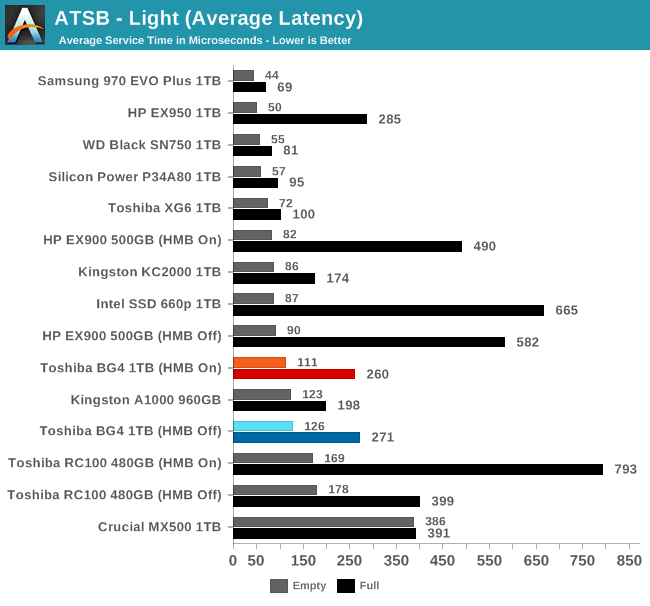
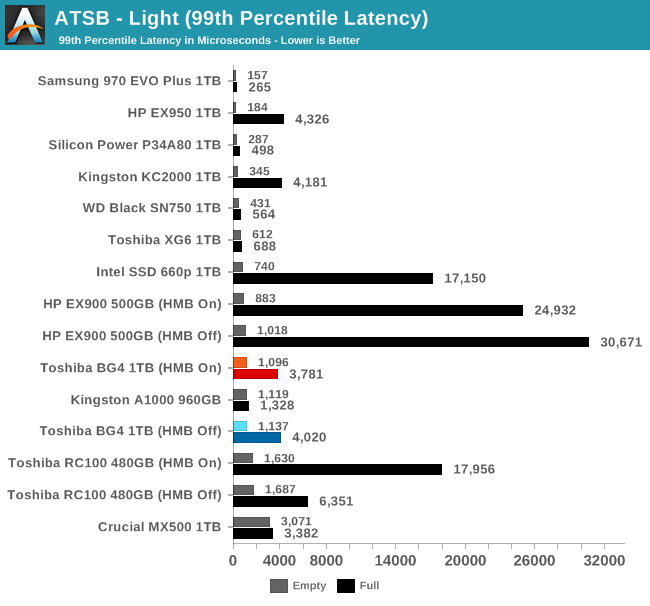
The 99th percentile latency from the BG4 during the Light test is much higher when the test is run on a full drive, but the disparity is nowhere near as large as for most of the other entry-level NVMe drives. The average latency scores are all better than the mainstream SATA drive.
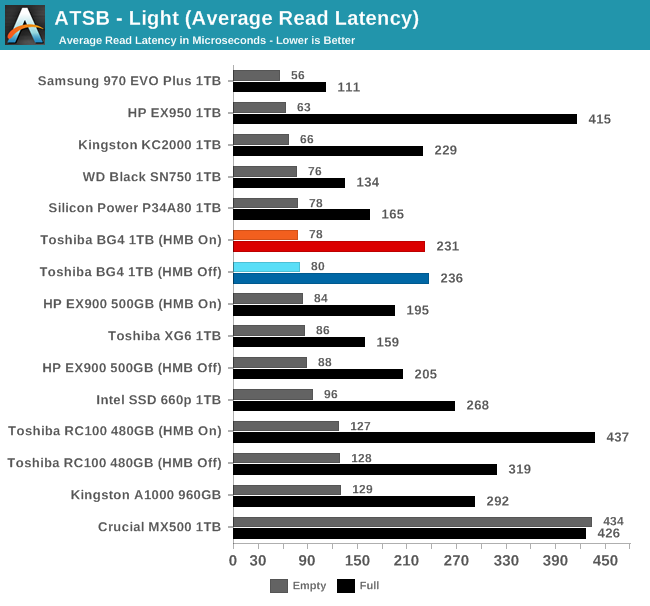
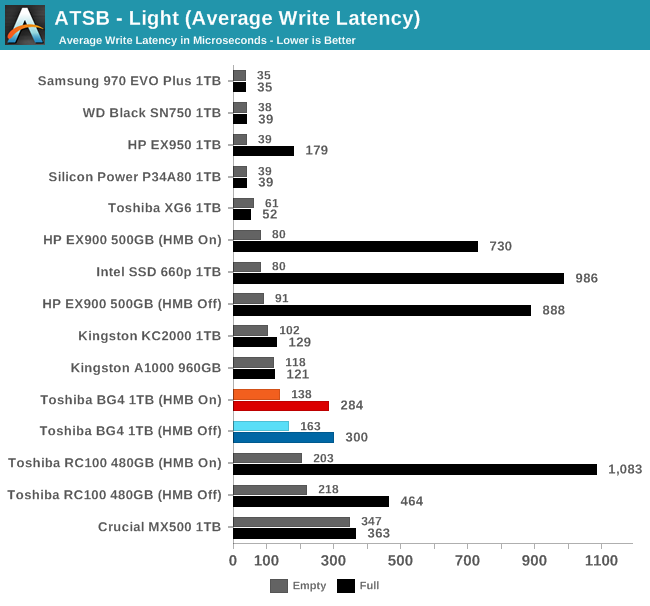
The average read and write latencies from the BG4 during the Light test are both fine. The writes are more clearly slower than high-end drives, but are still quick enough to have minimal effect on perceived performance.
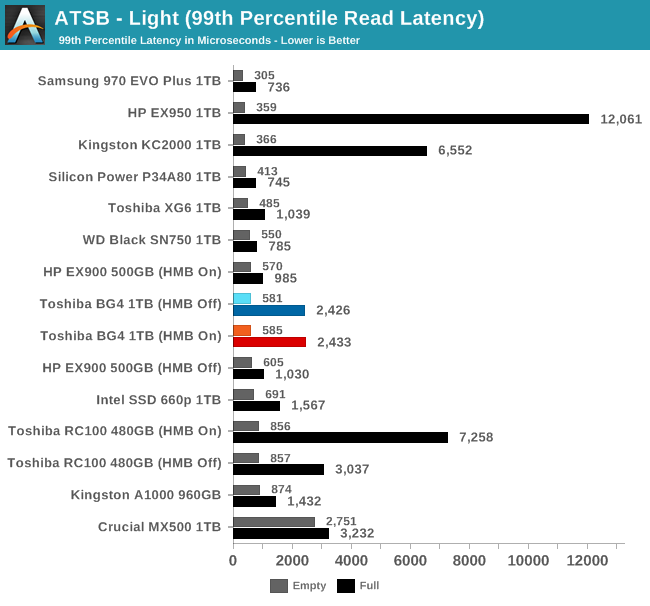
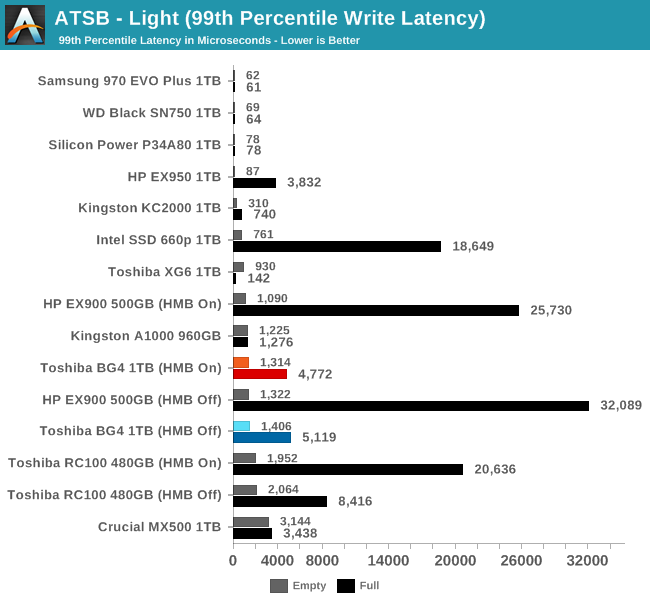
The 99th percentile read and write latencies for the BG4 on the Light test both show considerably higher latency for the full-drive test runs, but the latency doesn't get completely out of control. Worst-case write latency ends up only a little bit slower than the Crucial MX500.
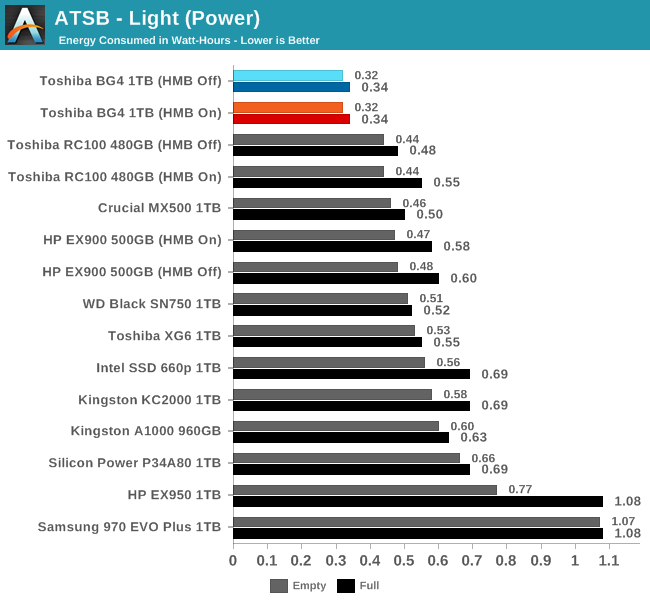
The BG4 again stands out with much better energy efficiency than the rest of the drives in this bunch, providing a clear improvement over the earlier RC100 thanks primarily to much higher performance.










31 Comments
View All Comments
MrCommunistGen - Friday, October 18, 2019 - link
I recently picked up a Dell Optiplex 3070 Micro for a family member, and it shipped with a 128GB BG4. Performance of the 128GB model is going to obviously be much lower than the 1TB model tested here.�From my anecdotal experience, performance is acceptable, but could easily be better. I replaced it with a 1TB XG6 (~$120 from eBay) - mostly for capacity, but the performance uplift was (understandably) noticeable.
abufrejoval - Friday, October 18, 2019 - link
Nice review for a solid product: Thanks!While I guess it reduces the worries about a soldered down SSD somewhat, I just hope they'll continue to sell even ultrabooks with M.2 or XFMExpress: Just feels safer and helps reducing iSurcharges on capacity.
Targon - Friday, October 18, 2019 - link
Agreed. If the motherboard fails, being able to remove the SSD for data recovery SHOULD be seen as essential by most people.Wheaties88 - Friday, October 18, 2019 - link
I don’t see why most manufacturers wouldn’t see it as useful as well. Surely it would allow for less replacement motherboards needed if they could simply change the drive size. But what do I know.kingpotnoodle - Monday, October 21, 2019 - link
Nobody considers it essential because relying on removing your SSD for data recovery if the motherboard fails is a deeply flawed strategy and not applicable to the vast majority of people who wouldn't even consider opening their laptop nevermind knowing how to remove the drive and access it outside the laptop.The same thing that saves you if your SSD fails will also save you if anything else makes the machine unbootable - a proper backup.
Targon - Monday, October 21, 2019 - link
You haven't had people come to you because their laptop has died but they need their data? Consumers may not be ready or able to get data from a dead laptop that has a drive you can remove, but the places they turn to SHOULD be able to.Tell me, can you recover data from a dead Macbook(dead motherboard) these days with the storage on the motherboard yourself? If the motherboard in your own personal laptop failed, wouldn't YOU want to be able to pull the drive if you needed data from it?
abufrejoval - Friday, October 25, 2019 - link
Those who know me well enough to entrust me with their computer, know me well enough not to come close with a Macbook.And I am not even all *that* prejudiced. I loved my Apple ][ (clone), went for the PC because even my 80286 already ran Unix and I was a computer scientist after all.
I keep doing Hackintoshs every now and then, just to get an understanding of how a Mac feels and because it's a bit of a challenge.
But it's seriously behind in just about every aspect important to me: The combination of Linux and Windows gives me much more in any direction, for work and for fun. And mixing both is much less of a technical issue than life-balance.
And then the notion of having your most personal handheld computer managed by an external party is just so wrong, I am flabbergasted that Apple managers still walk free, when computer sabotage is a felony.
The Apple ][ didn't even screw down the top lid. Swapping out components and parts, adding all sorts of functionality and upgrades made it great.
This solid brick of aluminum, glue, soldered on chips and hapless keyboard mechanics they call an Apple computer these days is just so wrong, I'd throw it into recycling the minute I got one for free. I don't know if I could give an Apple notebook or phone even to a foe, let alone a friend.
domboy - Friday, October 18, 2019 - link
Since Microsoft used this in the Surface Laptop 3, I wonder if they also used it in the Surface Pro X since that also has a removable SSD. I'll be interested to find out...taz-nz - Friday, October 18, 2019 - link
Now we just need them to apply this tech to a standard 2280 form factor and give us a 4TB m.2 SSD, doesn't have to have best in class performance just a consumer class 4TB m.2 SSD.Death666Angel - Saturday, October 19, 2019 - link
There already are Samsung and Toshiba 4TB M,2 drives.